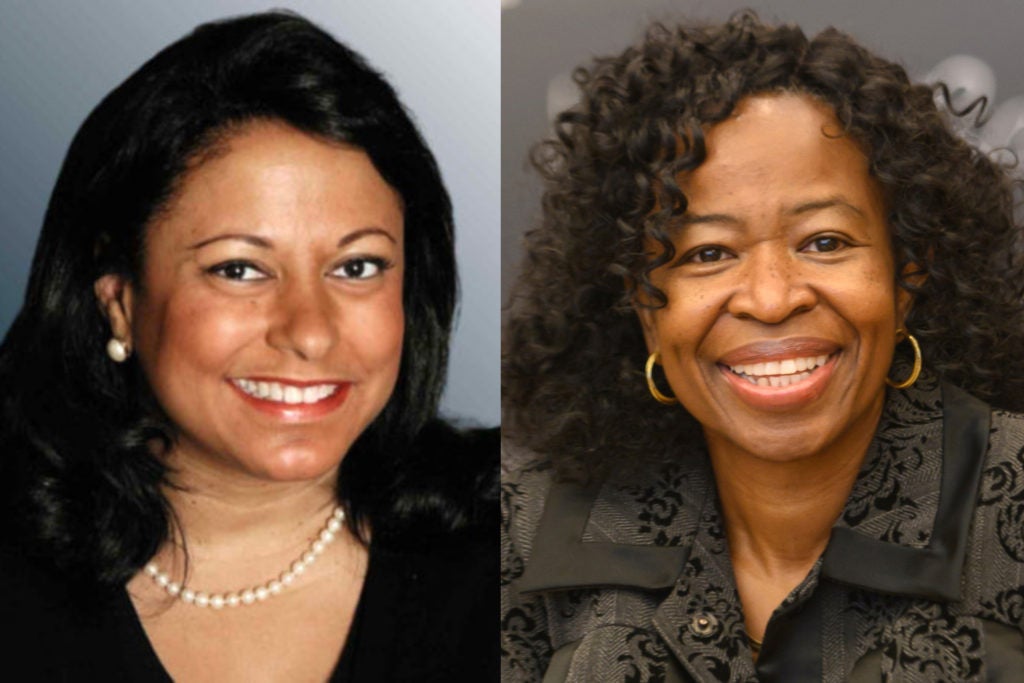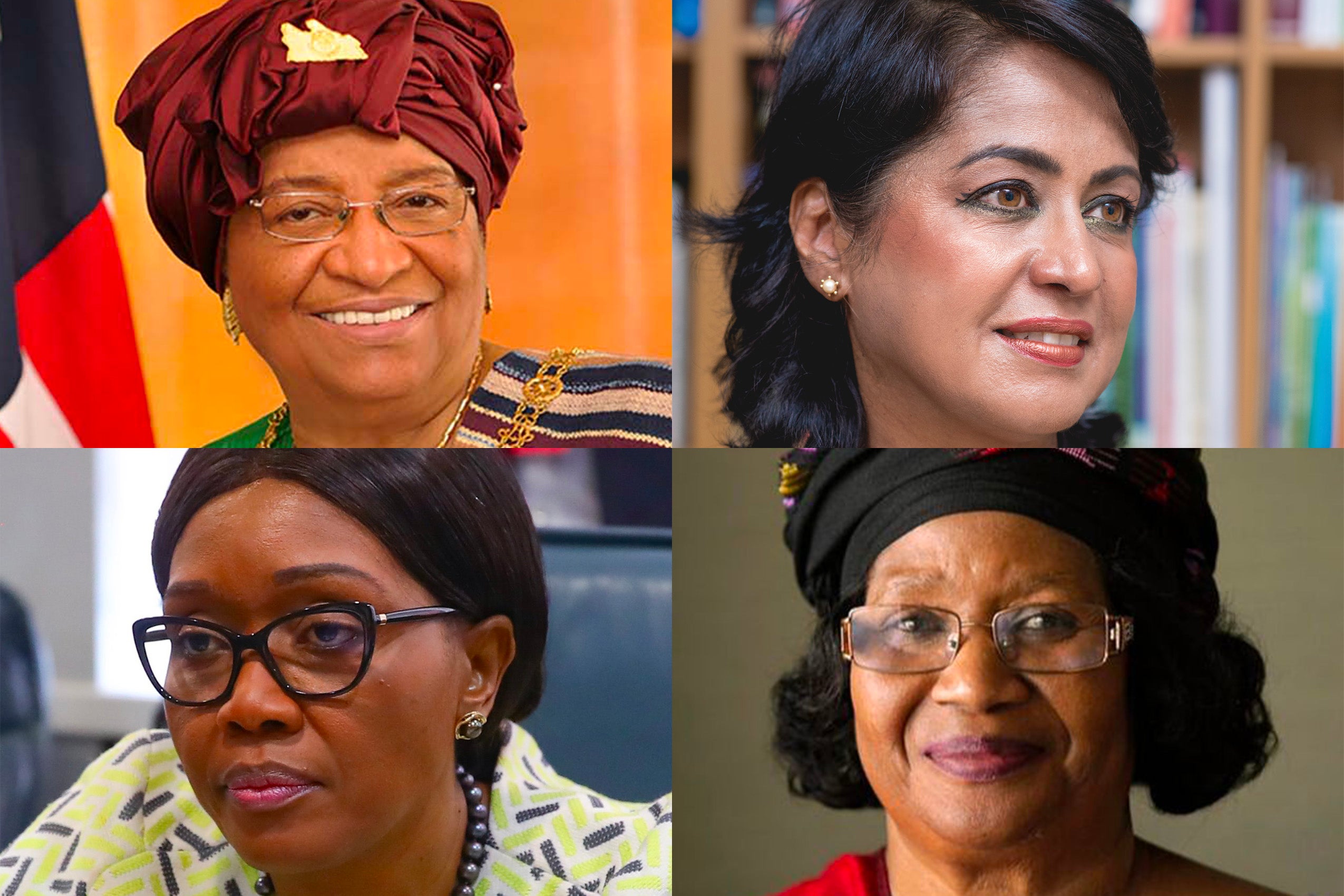There have so far been 22 women heads of state in Africa. But until last month, no four of those women had ever been in a room together, even a virtual one.
Even in Africa, few citizens are aware that so many women have served as president or prime minister — some for brief terms, and many during times of war, famine, financial insecurity, and disease. The historic virtual summit that brought these four together for the first time, called the Women Heads of State Initiative, was organized by Teresa Clarke J.D. ’87/M.B.A ’88 — an investment banker, noted humanitarian, and CEO of the website Africa.com. In addition to the heads of state, which included the current prime minister of Nambia and the former presidents of Mauritius, Malawi and Liberia, the meeting included the president of the African Development Bank, who spoke about securing Africa’s food supply; representatives of pharmaceutical and human rights organizations; and the African president of the Coca-Cola company. According to Clarke, who co-hosted the summit with Harvard Law School Professor Ruth Okediji LL.M. ’91 S.J.D. ’96, the focus was on identifying problems and working toward solutions.
“We tried to capture the good, the bad, and the ugly,” Clarke said. “Africa.com’s editorial voice toward Africa is more of a positive one. But we’re not Pollyannas, we’re not afraid to address problems. We tried to look at it as six opportunities for Africa’s advancement; that was the theme. So, it was quite intentional to focus on opportunities instead of problems.”

One of the most renowned participants was former Liberian president Ellen Johnson Sirleaf, a Nobel Peace Prize winner and 1971 graduate of Harvard Kennedy School, who is popularly known as “Africa’s iron lady.” Clarke mentioned her role in closing Africa’s gender inequality gap, particularly at the time of her election in 2006. In response, Sirleaf said, “What I did was to put women in strategic positions, ones that they had not held before — Ministry of Foreign Affairs, Ministry of Finance, Ministry of Commerce. Those are the ones where you send a message to others that all things are possible. That is our challenge right now, to get that wave of women so that nobody will ever be able to say again, ‘That position is highly technical and I can’t find any woman to do it.’ And I say, ‘No sir. We have three or four women ready’.”
Also speaking at the summit, Nambian Prime Minister Saara Kuugongelwa-Amadhila provided a sweeping agenda for going forward — including reproductive health care, promotion of gender equality, increased participation in international trade, and management of climate change. She also mentioned the ongoing effects of the coronavirus pandemic. “We need to fight COVID, including by assuring that our people are vaccinated. We have seen an increase in the supply of COVID vaccines to African countries, but the anti-vaccination campaign that is being propagated in many of our countries can discourage people from taking them; therefore, we remain susceptible.”
Clarke confirmed that vaccine hesitancy is an obstacle in Africa as in America, but different factors are involved. Some of this, she said, stems from the notorious “Tuskegee experiment,” in which numerous African-American men died of syphilis because they had been treated with placebos by researchers in the U.S. “The vaccine resistance that we’ve seen over decades is a reflection of the fact that African lives have been perceived not to matter in the pharmaceutical industry for a long time. In addition to that, you have many communities that practice traditional medicine with natural herbs, so these traditional doctors can be influencers to vaccine resistance.”
Joyce Banda, the former president of Malawi, talked about the financial hardships faced by women farmers. “I have always asked why women who till the land, plant the seed, nurture the crop, harvest, process and cook the food — eat less.” At Clarke’s urging, she also shared a bit of personal history: “By age 21 I was married; by age 26 I had three children. It was such an abusive marriage that after ten years I had to walk out. Two years later I went shopping for a better husband, and I got one.”
Clarke said afterward: “In our prep for this I asked if she would go there, because she’s been very vocal about the fact that her first marriage was abusive. And when you’re talking about Africa, or the West or any other part of the world, what woman leader has stood up and admitted that? She provides so much inspiration for women who are victims of domestic abuse, by standing up and acknowledging that. And that definitely became one of our big soundbites.”
Though she didn’t wind up going immediately into law, Clarke says that Harvard Law School gave her a solid background in business and social justice. All of this informs her work as the U.S. board chair of the Legal Resources Center, the largest public interest law organization on the African continent.
“We employ about 100 lawyers and staff who fight for human and civil rights in South Africa and southern Africa,” she said. “Those who work in this field must possess the ability to work for a lifetime to see incremental change. That is something I respect at its core, but I realize that I am much more impatient, and transactional — I need to see the results of my work today, not 25 years from now. And so, working with the LRC has been a wonderful opportunity at the strategic and the fundraising level to engage with the work in a way that suits my skill set and my nature.”
Clarke credits another Harvard Law School graduate, Julieanna Richardson ’80, for inspiring her own work. Richardson’s Chicago-based institution, The HistoryMakers, has documented thousands of African-American oral histories. “She now has a treasure trove of histories of African-Americans in the arts, in business and in government, histories that would have died with those people if she hadn’t recorded them. We’re doing the exact same thing with these women leaders in Africa; nobody has ever written or documented their stories.”
Her next project is to bring two of the summit participants, Gurib-Fakim and Sirleaf, together for a virtual dialogue — the first unscripted, unmoderated talk between two female African heads of state (The date is not announced as yet). And while Africa.com is building its own archive of oral histories, it will also offer hands-on workshops, including one scheduled for April 28 for women working in the public sector. “That’s the next thing we’re doing, to help train future presidents in Africa.”
